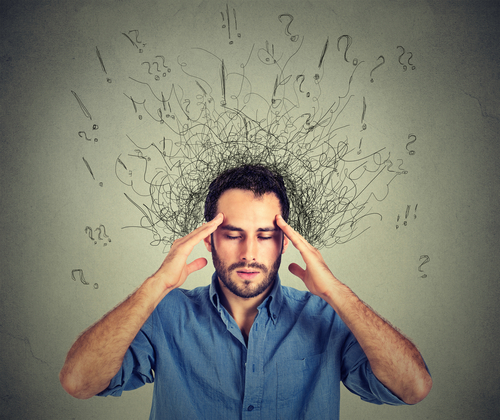Anxiety is a normal emotional reaction to stress. According to the American Psychiatric Association (APA), “anxiety refers to anticipation of a future concern and is more associated with muscle tension and avoidance behavior.” There are many benefits to experiencing occasional bouts of anxiety. Anxiety can help an individual avoid danger as its presence elicits a heightened state of alertness. Anxiety can help an individual further develop his or her empathy. Situational anxiety can contribute to enhancing one’s motivation and increasing performance levels. However, an individual that suffers from overwhelming anxiety that prohibits him or her from properly function in his or her daily life may be struggling with an anxiety disorder, and would likely benefit from treatment. Learning applicable tools and effective techniques to help cope with anxiety can be invaluable to one’s quality of life.
Physical Symptoms
Enduring excessive anxiety can result in psychological symptoms as well as physical symptoms that can affect one’s health and daily life. Healthline provides the following examples of common physical symptoms that could manifest as a result of anxiety:
- Stomach pain
- Muscle tension
- Headache
- Fatigue
- Digestive trouble
- Sleep disturbances: insomnia or other sleep issues (e.g., waking up frequently)
- Shortness of breath
- Sweating
- Nausea
- Trembling and/ or shaking
- Increased heart rate
- Rapid breathing
Every person is different and has the propensity to experience a unique combination of psychical symptoms of anxiety with varying levels of severity and durations.
Treatment
There are many treatment options for anxiety. In order secure the most effective treatment it is essential to be evaluated by a qualified mental health provider so as to obtain an accurate diagnosis. There are two main avenues of treatment for anxiety, which include psychotherapy and medication, and they are not mutually exclusive. An excellent method of treatment to target the physical symptoms of anxiety is dialectical behavior therapy (DBT). DBT is an evidence-based psychotherapy that focuses on the psychosocial aspect of treatment. It incorporates many of the principles of cognitive behavioral therapy (CBT), and relies heavily on mindfulness skills originating from Zen and Buddhist practices.
DBT utilizes four main strategies, which are referred to as behavioral skill modules, and include: core mindfulness, distress tolerance, interpersonal effectiveness, and emotion regulation. Through DBT clients learn to rely on specific mindfulness techniques that enable them to live with pain in the world and accept the way things are in any given moment instead of having to endure the suffering that comes when trying to change them. Additional therapeutic modalities used to treat anxiety include: cognitive behavioral therapy (CBT), expressive arts therapy, interpersonal psychotherapy (IPT), and more. There are several different types of medications that can be used to treat anxiety, including:
- Antidepressants: used to relieve symptoms of anxiety and depression; selective serotonin reuptake inhibitors (SSRIs), norepinephrine reuptake inhibitors (SNRIs); examples include Lexapro (escitalopram), Zoloft (sertraline), Prozac (fluoxetine), Cymbalta (duloxetine), Effexor XR (venlafaxine), and Paxil (paroxetine)
- Azapirones: mild anti-anxiety medications, suitable for long-term use; example Buspirone
- Benzodiazepines: fast acting medications intended for short-term, sporadic use; examples include Xanax (alprazolam), Rivotril (clonazepam), and Ativan (lorazepam)
- Anti-convulsants/ antipsychotic medications: less frequently used, but approved for treating generalized anxiety disorder; example Stelazine (trifluoperazine)
Every individual is unique and will respond distinctly to the various treatment options available. In most cases when treating anxiety, integrating a combination of both psychotherapy and medication yields the most successful and long-term results.
Disclaimer:
The information above is provided for the use of informational purposes only. The above content is not to be substituted for professional advice, diagnosis, or treatment, as in no way is it intended as an attempt to practice medicine, give specific medical advice, including, without limitation, advice concerning the topic of mental health. As such, please do not use any material provided above as a means to disregard professional advice or delay seeking treatment.


